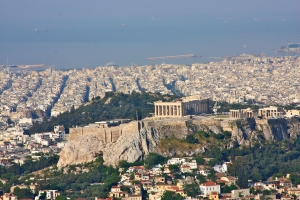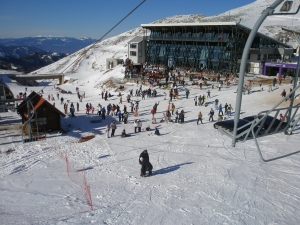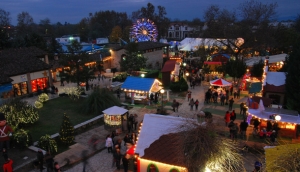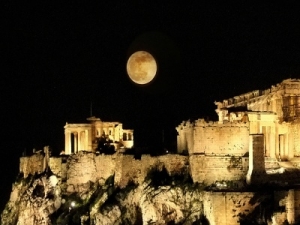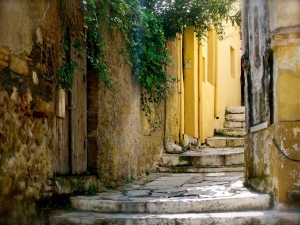BUSINESS CENTRE
XpatAthens
Monday, 04 January 2016 07:00
Athens: The Grandest Open-Air University In The World
Walking the cobblestone pathway of Europe's largest archaeological park in Athens is a rewarding history lesson in the world's grandest open-air university.
There are no fees, no professors, no homework. You don't even have to attend everyday, just as and when there's an itch of intrigue.
Like Rome, Athens surrounds you with the ancient: the Acropolis, the Theatre of Dionysus, Herodes Atticus, Arch of Hadrian and the Athennian Trilogy. It's the crumbling Meccano kit of empires built and empires destroyed.
No other country can boast such a hard-bastard dynasty of athletes, Titans and Gigantes. And it's the Greek history and landscapes, even more than empirical brick-and-mortar that jointly built the modern Greece we know today.
Here is a country routed in our consciousness, whether we've visited it or not. The names of ancient Gods and Goddesses are taught to us at an early age, and the epistemology of their philosophers still widely referenced in society today.
Those of you with a loathsome memory of school Maths will recall Pythagoras's Theorem, the Trigonometry thorn that created hatred ina ll exam-sitters for Greek mathematicians. Then, there are the philosopheres and the poets - the scholars. Greek mythology and Greek tragedies. We think of the Olympics, we think of Greece. Even their yoghurts are famous.
To read more, please visit: Daily Mail Online
by
David Constable
Published in
Greece In The News
Tagged under
Monday, 04 January 2016 07:00
VC Money Pours Into Greek Start-Ups
In a modern high-tech office, two software engineers are busy directing an army of young engineers as they work on upgrades for their three-year-old cloud-based recruiting software company, Workable.com, which already has 3,500 customers in 50 countries and has attracted more than $34 million in venture capital.
It would be just another Silicon Valley success story if it weren't for the company's home base: Greece, a country that is the basket case in the euro zone because of economic mismanagement, public sector corruption and a youth unemployment rate that's a staggering 60 percent. The situation is so dire, suicide rates are on the rise, and there is an exodus of talent looking for opportunities abroad.
Despite the bleak outlook, there is a growing cadre of Greek entrepreneurs determined to defy the odds and build high-tech businesses that can thrive, providing a glimmer of hope for the economy. These trailblazers are patriots. As the most highly educated generation in the nation's history, they are determined to grow their ideas on home soil even as Greece grapples with budget austerity, and regulatory changes that are undermining the middle class and threatening national sovereignty.
"The crisis has pushed people into survival mode, and they are looking for opportunities," according to Stavros Messinis, CEO and founder of The Cube, a start-up incubator in Athens. "At this point, there isn't much for them to lose."
Most are tired of an unstable political system unable to put the country back on its feet. Since the start of the economic crisis in 2009, Greece has lost more than 25 percent of its GDP, and thousands of enterprises have gone bust under the pressure of a deepening recession. This summer the country defaulted on more than $280 billion of debt, and capital controls were issued to prevent a run on the banks.
As Messinis explained, "Up until now, 70 percent of Greeks were employed by the public sector. But that is now crumbling. Now we need to develop a high-tech sector that can produce value-added products and services to turn the economy around."
"The crisis has pushed people into survival mode, and they are looking for opportunities," according to Stavros Messinis, CEO and founder of The Cube, a start-up incubator in Athens. "At this point, there isn't much for them to lose."
Most are tired of an unstable political system unable to put the country back on its feet. Since the start of the economic crisis in 2009, Greece has lost more than 25 percent of its GDP, and thousands of enterprises have gone bust under the pressure of a deepening recession. This summer the country defaulted on more than $280 billion of debt, and capital controls were issued to prevent a run on the banks.
As Messinis explained, "Up until now, 70 percent of Greeks were employed by the public sector. But that is now crumbling. Now we need to develop a high-tech sector that can produce value-added products and services to turn the economy around."
To read more, please visit: CNBC
Published in
Local News
Tagged under
Monday, 14 December 2020 07:00
The Ancient Greek Roots Of Christmas
Christmas is the most important – and perhaps the most treasured – celebration of Christianity filled with joy and love. Countries around the world celebrate with different customs that have deep roots within history and tradition. In Greek tradition, there are a variety of similarities in the commemoration of the birth of Christ and Dionysus, thus between ancient and contemporary Greece.
In December, the ancient Greeks celebrated the birth of Dionysus, calling him “savior” and “divine infant.” According to Greek mythology, his mother, Semele, was a mortal woman and his father was Zeus, the king of all Gods. The priest of Dionysus held a pastoral staff as did the Good Shepherd. On December 30, ancient Greeks commemorated his rebirth.
The most well-known custom throughout the Christian world are the Christmas carols, songs dedicated to the occasion. Also in ancient Greece there were specific “carols” for the rebirth of Dionysus. Specifically, Homer — during his stay on the island of Samos, along with a group of children, composed carols. In ancient Greece, carols symbolized joy, wealth and peace, and the children sang the carols only in the homes of the rich. Children would go from house to house, holding an olive or a laurel branch adorned with wool (a symbol of health and beauty) and different kinds of fruits. The children brought the olive branch to their homes and hung it on the doors where it remained for the rest of the year.
A New Year’s cake, which since early Christian times has been called Vasilopita, or St. Basil’s cake, also resembles an ancient Greek custom, as ancient Greeks used to offer Gods a “festive bread” during rural festivals, such as the Thalysia or the Thesmophoria.
A New Year’s cake, which since early Christian times has been called Vasilopita, or St. Basil’s cake, also resembles an ancient Greek custom, as ancient Greeks used to offer Gods a “festive bread” during rural festivals, such as the Thalysia or the Thesmophoria.
To learn more and view this article in full, please visit: Greek Reporter
Published in
Greek Language & Culture
Tagged under
Monday, 03 December 2018 07:00
Scenic And Smoke-Free Cafes In Athens
For those of us that live in Athens, we know that going out with friends and meeting to chat over a coffee is part of a very typical way of life in Greece. While it's a lovely aspect of Athenian culture, if you are a non-smoker and want to sit inside during the cooler months, you may find it challenging to find a smoke free venue.
For those who aren’t familiar with smoking habits in this part of the world, smoking is still a widely accepted habit. It is very common to see customers lighting up freely at an indoor cafe, restaurant or tavern. However, if you like to enjoy your coffee smoke-free then Marissa Tejada of Travel Greece Travel Europe gives us some great options as she explores and shares with us her list of scenic and smoke free indoor cafes in Athens.
For those who aren’t familiar with smoking habits in this part of the world, smoking is still a widely accepted habit. It is very common to see customers lighting up freely at an indoor cafe, restaurant or tavern. However, if you like to enjoy your coffee smoke-free then Marissa Tejada of Travel Greece Travel Europe gives us some great options as she explores and shares with us her list of scenic and smoke free indoor cafes in Athens.
Address: Giorgiou Karaiskaki 17, Psirri
Step into a story book at this beautiful indoor café. The new venue is decorated to the nines for Christmas. You can sit under a huge Christmas tree and sip your tea! Everything inside Little Kook follows a story book theme. The waitresses and waiters even dress the part of various fairytale characters. The menu is a scroll! There's an ample selection of gourmet hot chocolates, coffees, teas and sweets such as cakes and crepes. Be sure to check out the second floor too - the cafe's decor will have your eyes wandering!
Address: Omirou 33, Kolonaki
Petit Fleur is simply charming. The décor is cozy, warm and bright. The one I frequent, when I can, is in Kolonaki. I say that because there aren’t many indoor tables at the Kolonaki venue, our outdoor seating for that matter, so many times I’ve had to move on. There are several other locations throughout Athens including Halandri, Kifisia and Pangrati. The large, thick and delicious hot chocolates are definitely worth trying. The carrot cake is super.
Address: Solonos 49, Exharcheia
This tiny café specializes in, well, chocolate! I seriously had the best cup of hot chocolate here recently. I tried the Madagascar blend. If you prefer your coffee, there is a selection of coffee as well. The Dark Side also sells handmade truffles and beautifully boxed chocolates. There are just a few tables inside that look out onto a view of Solonos Street. The interior is plain, simple, relaxing and quiet.
Address: National Gardens, Athens
Located in the heart of the National Gardens next to the stately neoclassical Zappeio landmark, you’ll find Aegli Cafe. There are dozens of tables both inside and outside. I think it’s really much nicer to sit outside in the open café space where you can have a view of the park or Mt. Lycabettus hill. There are also some outdoor heated spaces. However, if the weather is too cold for you, the inside space is wonderfully smoke free! There’s a large menu of snacks, sweets and all the typical coffees and teas you desire. Take a walk around the beautiful park afterwards. The outdoor cinema is a favorite in the summer months.
To read more, please visit: Travel Greece Travel Europe
Image Credit: @LittleKook
Published in
Pubs, Bars & Cafes
Tagged under
Tuesday, 29 December 2015 07:00
Parnassos Ski Center
The Parnassos Ski Center, Greece’s largest located in Central Greece, is up and running and ready to welcome snow and ski lovers to its slopes.
The popular ski resort officially launched for operation on Christmas Eve, with its Aeolus and Pericles trails ready for action and its Venus, Baccus, Aeolus and Dias lifts in place.
Ski and snowboard lovers will have the chance to enjoy their favorite sport as the first snowfall officially marks the beginning of the season.
To read more, please visit: Greek Travel Pages
Published in
Travel Greece
Tagged under
Wednesday, 30 December 2015 07:00
The Mill Of Elves In Trikala
The city of Trikala in Central Greece has become known as a winter destination because of an innovative idea to turn an old mill into the largest Christmas theme park in Greece. Four years after its inception the project has evolved from a small Christmas fair to a large theme park that last year welcomed more than 850.000 visitors.
“It wasn’t easy in the beginning to convince the city’s council to spend a million euros to make a seasonal theme park that operates only for 38 days per year and then it is deconstructed, while visitors pay nothing to enter” said Odysseas Raptis, the CEO of eTrikala S.A. who runs the project. “Our goal wasn’t to make money from the project itself, but to find a way to stimulate the local economy.”
Within four years, they are almost breaking even, while the “The Mills of Elves” brings in about 15 million euros to local businesses and the surrounding villages.
“Greece didn’t have a big Christmas theme park and we thought that this would be an excellent idea for people to come to our city,” added Raptis.
Published in
Greece In The News
Tagged under
Monday, 28 December 2015 07:00
Bring A Child To Work
Over the past years, the South African Embassy has pursued educational and cultural projects as they are of vital importance in promoting South Africa's culture and diversity abroad.
In this respect, The Embasy initiated a school project called 'bring a child to work.' The project serves as a career guide, providing motivation for students to better identify themselves with careers in the public sector or related fields.
Othisis School had the opportunity to visit the South African Embassy premises and learn more about how an Embassy functions on a daily basis. The Head of Mission and Embassy's diplomats welcomed the students, provided a brief background about South Africa and answered questions asked by students. By the end of the visit, students had a clear picture of South Africa and its presence in the Hellenic Republic.
Published in
Local News
Tagged under
Saturday, 01 October 2016 18:06
Ice Skating In Athens
A recent leisure activity to enjoy during winter in Greece is ice skating! Ice skating is great for all ages and can be found at various spots around the city. Here we provide you with information on where to find ice rinks - either permanent or mobile - in Athens.
If you know of an ice rink and it's not below,
let us know by email at ideas@xpatathens.com.
let us know by email at ideas@xpatathens.com.
Ice Rink in the Heart of Athens
The largest, permanent ice rink in Greece is ready to welcome everyone this winter. Operating from 19th September 2015 to the end of April 2016, the ice rink is over 1,000 square meters. Located next to the Athens Heart Shopping Mall, the rink is covered by a specially designed tent, making it possible to skate in all weather and is perfect for families.
Price: €10 for an unlimited session
Opening hours:
Mon-Fri: 15:00 - 23:00
Weekends: 11:00 - 23:00
Address: Piraeus St 186, Athens,
Ice Arena at Megaron Concert Hall
Ice Arena, for the first time in the history of Megaron, operates at its premises one of the most elegant and unique ice rink in Athens throughout the winter season.
In the special and original area of the "Atrium", the new ice rink of ICE ARENA with a size of 375 square meters, completely covered by a beautiful and original tent so guests can skate in all weather conditions.
The service of our customers begins at the modern and picturesque houses of the ice rink, where our staff will help you rent skates and gives you the first necessary advice. Then you are ready to enjoy the top quality of ice for unlimited time, always accompanied by the specialized staff Ice Arena for your safety.
Price: €10 for an unlimited session
Opening hours:
Mon-Fri: 16:00 to 23:00
Weekends & holidays: 11:00 to 23:00
Address: Athens Concert Hall, Vas. Sofias Ave. & Kokkali St., 115 21 Athens
Ice Arena at Village Shopping
In the open space of "VILLAGE shopping and more…," next to the cafeterias, the restaurants and all the playgrounds, a new ice rink of 400 m² is created, which is fully covered by a beautiful and practical tent for skating under all weather conditions.
"VILLAGE shopping and more..." covers all the needs of its visitors who want to enjoy the huge movie theatre or dozens of shops for a coffee, food, ice cream and all sorts of different entertainment for children and shopping for adults.
Everything under one roof.
Price: €10 for an unlimited session
Opening Hours:
Mon-Fri: 16:00 - 23:00
Weekends: 11:00 - 24:00
Sources: Livin'Lovin' and Ice Arena
Price: €10 for an unlimited session
Opening Hours:
Mon-Fri: 16:00 - 23:00
Weekends: 11:00 - 24:00
Sources: Livin'Lovin' and Ice Arena
If you know of an ice rink and it's not in this list,
let us know by email at ideas@xpatathens.com.
Published in
City Discovery
Tagged under
Tuesday, 22 December 2015 11:20
Christmas Full Moon - First In 40 Years
Not since 1977 has a full moon dawned in the skies on Christmas. This year a bright full moon will be an added gift for the holidays. The last of 2015, December's full moon is called the Full Cold Moon because it occurs during the beginning of winter.
In the future, Christmas will coincide with a full moon every 19 years. This rare event won't happen again until 2034 (then in 2053 and 2072) so be sure to look up to the skies on Christmas Day!
Source: ScienceDaily
Published in
Local News
Tagged under
Tuesday, 22 December 2015 11:04
Reflections Of Life In Greece 2015
With Christmas around the corner and the end of the year in sight, many of us pause from shopping and cooking to look back at 2015. Some of us have reactions like ‘what was that??!’, while some others of us still prefer to count our many blessings… No matter what side of the proverbial fence you sit on – nor if you wobble back and forth like me – we can all reflect on a year that was defined by challenges, struggles, confusion…
This was a year that I often needed reminding of the reasons why I moved to Greece… Surrounded by so much that reminds of the contrary, revisiting those reasons, for me, told me that not so many of them have changed. In fact, all the things that brought me here still apply. So here I remain.
I came across two interesting articles that I want to share – one in English and one in Greek.
The first one is a piece by David Constable in the UK’s Daily Mail. He speaks about Athens as the ultimate open-air university – and reminds us of some of the things we all know and love about this city that – he says - has ‘its greatest years still ahead…’ Check it out HERE.
The second piece is a list of ‘interesting facts’ about Athens and Greece, which are quite familiar – but interesting nonetheless. At the very least, these are useful to pull out for Christmas dinner conversation. The original Greek piece is HERE and below are a few facts translated:
1. On average, around 16.5million tourists visit Greece each year.
2. 7% of the world’s marble comes from Greece.
3. Greece is the world’s 3rd largest producer of olives – with some olive trees dating back to the 13th century!
4. Greece is the world’s largest producer of natural sponges.
5. 80% of the country’s land is mountainous, without a single ‘navigable’ river
6. 12 million people speak Greek around the world.
7. In the 1950’s, literacy was around 30%. Today, it’s around 95%
8. Although there are 2,000 islands in Greece, only 170 of them are populated.
9. The population of Athens in 1834 was 10,000 people.
10. Athens has been continuously inhabited for more than 7,000 years, making it one of the oldest cities in Europe.
11. Greece enjoys 250 sunny days each year – that means more than 3,000 hours of sunlight!
12. In ancient Greece, life expectancy was 36 for women and 45 for men – with more than half of all babies not living past infancy. Today, life expectancy is 77 (men) and 82 (women).
13. 70% of Europe’s merchant marine fleet fly Greek flags. Those ships must have 75% of their crew with Greek nationality.
14. Greece has more archaeological museums than any other country in the world.
15. Around 100,000 birds from northern Europe and Asia spend winters in Greece.
16. Slaves in ancient Greece made up 40-80% of the population of the city-states. These slaves were usually prisoners of war, abandoned children, or children of slaves.
17. Greece has 116 species of mammals, 18 species of amphibians, 59 species of reptiles, 240 species of bird and 107 species of fish. Around half of the mammal species are in danger of extinction.
18. No point in Greece is more than 137 kilometres from the sea. Greece has the 10th longest coastline in the world.
With this, I wish for everyone a happy and healthy 2016, full of sunny days and many smiles!
Until next week,
Jack
Published in
My Week In Athens
Tagged under


